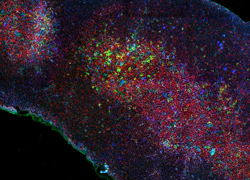Despite their discovery over 25 years ago, mucosal-associated invariant T cells, known as MAIT cells, have only recently gained the attention of researchers, having been revealed as key infection fighting cells.
Doherty Institute Immunology Theme Leader and Laboratory Head, Professor Dale Godfrey, is part of a collaborative network dedicated to developing a greater understanding of MAIT cells and their role in the immune system.
Professor Godfrey, postdoctoral researchers Dr Fern Koay, Dr Nicholas Gherardin and University of Melbourne Deputy Vice-Chancellor (Research) Professor Jim McCluskey have published a comprehensive Review in Nature Immunology.
“Our Review looks at research from around the world that shows MAIT cells key to the immune system, focusing on their basic biology, development, role in disease and immunotherapeutic potential,” Professor Godfrey said.
“These are exciting times in the field of immunology and immunotherapy, and it is likely that MAIT cells will have an important role in future approaches to a range of diseases.” As written in a Review for Nature Immunology.
More updates and news from the Doherty Institute
